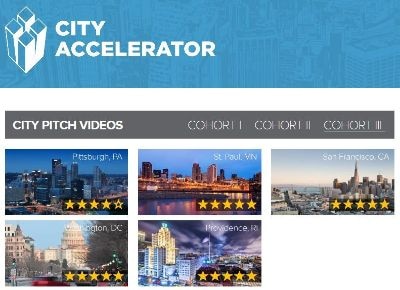Cities Build Up Innovation to Tackle Breakdown in Urban Infrastructure
The unfolding water contamination issue in Flint, Michigan, which led to the declaration of a federal emergency, is the latest example of the challenges that many of our nation's cities face when it comes to the deterioration of aging infrastructure. From transportation and stormwater to broadband and energy efficiency, cities are juggling limited resources to build and maintain vital capital assets to meet even the most basic needs of residents, especially in low-income communities. It is estimated that the growing demand for infrastructure improvements totals more than $60 trillion globally. Increasingly, cities and states are being required to cover these costs on their own, requiring enormous coordination and new financing mechanisms to address this large and growing funding gap.
This redirection of funds can take a toll on a city's most vulnerable populations, diverting scarce resources from other critical services. Cities must develop a capacity to smartly resource their infrastructure priorities, so they can better equip themselves to tackle issues like poverty, education and job creation, and have more funding at their disposal to do so.
In the recently released 2015 Menino Survey of Mayors, local leaders noted that they are receiving reduced levels of funding and support at the federal level, and are as a result being increasingly forced to take this daunting challenge into their own hands. That's why Living Cities and the Citi Foundation have designed the third cohort of City Accelerator—an initiative that's helping 11 select U.S. cities foster innovation and collaboration between urban leaders—to test, innovate and codify new ways of building, repairing and maintaining much needed infrastructure.
The City Accelerator focuses on standardizing emerging state-of-the-art practices in the municipal innovation field and encouraging their adoption more widely. In the first cohort, Philadelphia is helping low-income residents through the application of behavioral economics or "nudges." By testing what impact changes to envelope sizes and hand-written letters make when communicating with taxpayers about rebates and subsidies, the city is gaining a new understanding about what motivates people to enroll in such programs. And by providing greater resources and a firmer structure for cities to work together in new ways, City Accelerator helps cities experiment more rapidly and effectively to develop scalable solutions to systems-level hurdles.
Cities selected for the third cohort will disrupt old ways of planning, prioritizing and budgeting for infrastructure projects. Exposure to one another and cutting-edge financing models from across the country and around the world will help this cohort model more effective ways to overcome infrastructure financing challenges. Other cities will be able to draw lessons from the infrastructure finance cohort to apply to their own systemic roadblocks and improve planning and budgeting for addressing city infrastructure needs.
What the current situation in Flint shows is that, to meet the infrastructure challenges of our time, our cities require governments to think and act creatively..
Follow us on our journey as we learn with the City Accelerator's Infrastructure Finance cohort about how cities can be competitive in the global economy, improve the quality of life for residents and foster the development of long-term economic opportunities to all.
Read updates and lessons from the cohort cities over the next 18 months at governing.com/cityaccelerator. Join the conversation on social media with the hashtag #CityAccelerator.
You can begin now by viewing, rating and recommending each city's project pitch:
This post originally appeared on Governing.com. Learn more about the City Accelerator program here: https://www.governing.com/cityaccelerator
